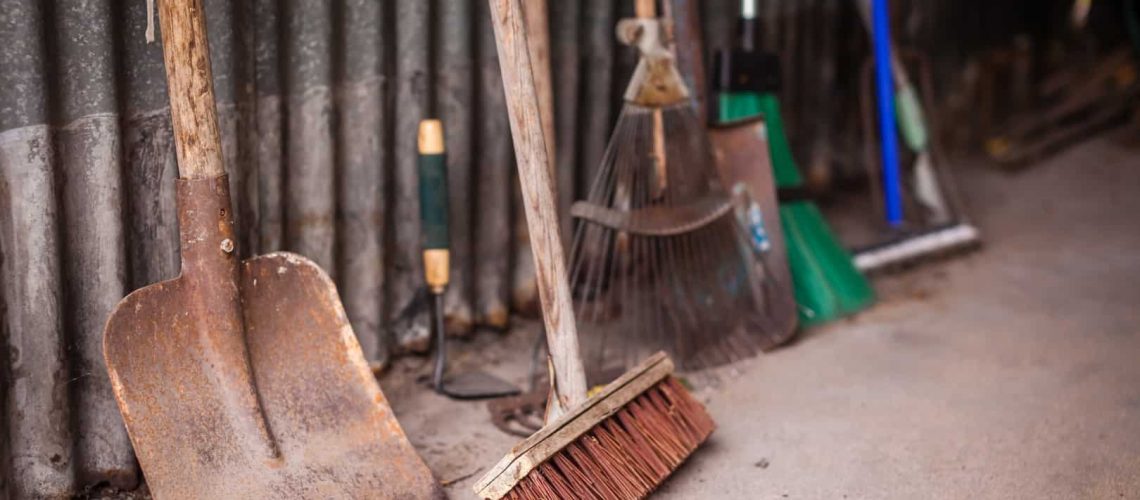Woodworking or garden tools are very expensive, and such a big investment in your business or hobby requires the utmost care. Seeing it go to waste in such a short time can be heartbreaking and frustrating. Since most tools are made out of metal, it makes them prone to rust. This leads one to wonder, “how do I keep my tools from rusting?”. Most people store their tools in their garage or shed, and the atmosphere in such places can be hot and humid, causing this to take a toll on your tools in the form of rusting and corrosion.
Where and how you store your tools and making sure that moisture is often present in that place is absolutely essential. Following are some things you can do to ensure that your shed’s environment is compatible with tool storage:

The Right Material
Wood can warp and rot very easily, and it is easily susceptible to extreme weather conditions such as rain and heavy winds. Metal or steel, on the other hand, can withstand such conditions and are very durable. Hence, having a metal or steel shed can prove to be very efficient for storing your tools as it is also fire-proof, so you will not even have to worry about it blowing up in flames if struck by lightning!
Galvanized steel is known to be the best and wisest choice in building up a shed, for it not only looks good but also lasts for decades.
Shed’s Size
Although it might seem foolish, the size of a shed does, in fact, play a role in deterring rust. If your shed is too small in size, you will have to jam-pack your tools, making it difficult to notice where (or if) any of your tools have started rusting, and you may not notice until it is too late.
Having a shed too big, on the other hand, can also hinder you from noticing corrosion in the places you are not utilizing for storage. Choosing a shed that is ‘just right’ will help you in keeping check of everything that is going on in all the areas of your shed.
Items that Encourage Dampness
If your shed has any gutters, make sure you keep them clear of debris and clean for the rainwater to flow easily. If this is not done, additional moisture will be created inside the shed, further leading to the growth of mold and mildew, which will not just stop at the gutters.
Another thing is to keep soils away from your shed. While it may look very pleasing to surround your shed with a little garden, it is unfortunately not efficient for shed longevity as soils and gardens are likely to retain water. This would not be such a good idea as your shed would literally be surrounded by tons of moisture, and you can say goodbye to your precious tools.
Windows or Fans
Proper ventilation is no doubt the key to warding off all the rust and corrosion. Installing windows in your shed will allow sunlight and fresh air inside, keeping your tools safe. If you do not prefer windows in your shed, you can opt for air vents or ceiling fans. Fans can help in circulating the air, hence, keeping the moisture levels from rising.
Humidifier
The atmosphere inside a shed can get very humid, especially if you live in a humid region. For this reason, installing a dehumidifier should prove to be effective for keeping it fairly dry inside the shed.
Placing an open tray of cat litter inside your shed could also do the trick as it absorbs liquids and helps in keeping the moisture levels down. Moreover, leaving a barrel or pail of sawdust or strategically placed charcoal briquettes can also prevent rust from forming.
Other than maintaining the proper environment in your shed, you can also work on making your tools rust-proof. It is suggested that you store your tools with vapor corrosion inhibitors (VCI) products, such as zipper bags, mesh liners, or capsules. These products are permeated with rust-inhibiting compounds that first vaporize and then attach to the metal surfaces of the tools. These vapor molecules form an anti-corrosive coating on the tools, which prevents rust.
VCI Zipper Bags
If you possess some critical measurement tools, like calipers or micrometers, it is best to keep them inside a VCI zipper bag which offers your tools five-year protection.
Non-slip feature/Mesh Liners
Lining your toolbox, or any container you are storing your tools in, with an anti-corrosion non-slip mesh liner serves to be very helpful. This feature also lasts longer than the anti-corrosion feature, the duration of which is roughly five years.
VCI Capsules
Adding a VCI Capsule to your toolbox or case helps in keeping your tools in perfect condition. Most home centers carry VCI products, but if yours does not, do not fret. You can check out zerustproducts.com, which is available to help protect your precious metals.
What to do if your tools are already rusting or rusted?
If your tools are already rusted, it does not mean you will have to throw them all away and that everything is over. There are still some things you can do to remove the current rust and also prevent future rusting.
- Remove dust and grease with dish soap
- Scrub the rusty tools with an abrasive pad or vinegar
- To buff away stubborn rust, use a drill-powered wire wheel
- Soak the tools in oxalic acid solution
All in all, it is crucial that you prevent moisture from forming inside your shed, for it can do lots of damage to your tools. Keeping them off the floor, on shelves, or inside VCI lined toolboxes can greatly prevent corrosion and save you the mess of scrubbing off the rust or having to buy entirely new and expensive tools. Following the aforementioned tips and tricks can do wonders and will save you the trouble, money, and time of dealing with corrosive, rusty tools.
Have you got any more tips on how to prevent rust on your tools? Get in touch!

